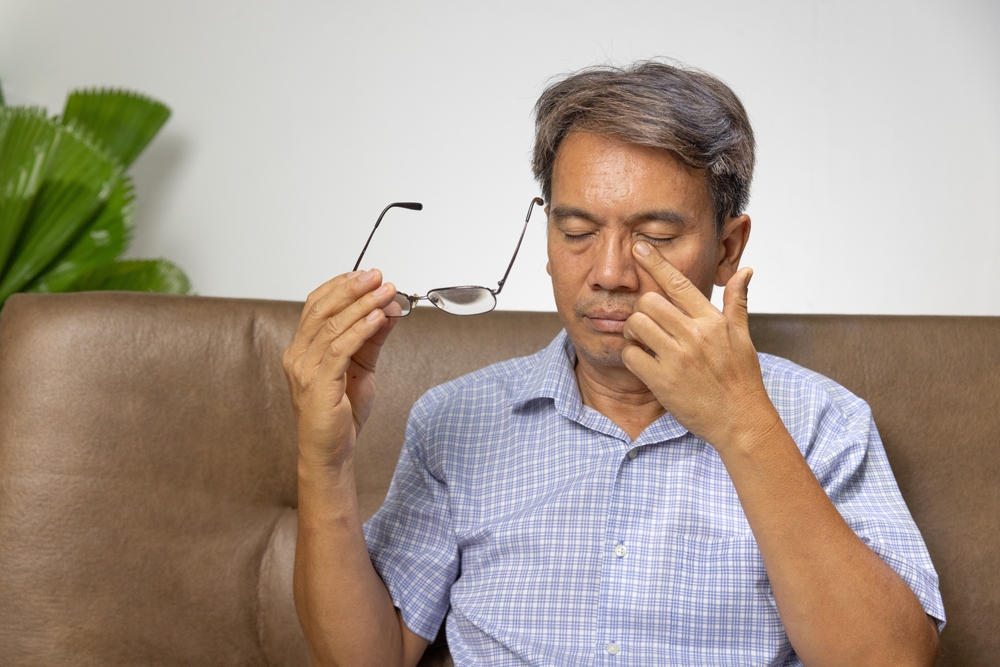
Dry eye occurs when the eyes don’t produce enough tears or when the tears evaporate too quickly. This can lead to various symptoms and cause discomfort, irritation, and vision problems.
While dry eye can be caused by various factors, certain habits and environmental conditions can exacerbate the symptoms. Keep reading to learn seven things that can make dry eyes worse and what you can do to minimize their impact on your eye health!
1. Environmental Factors
The environment plays a significant role in the severity of dry eye symptoms. Exposure to wind, dry air, smoke, and air pollution can increase tear evaporation, leading to dryness and irritation.
If you live in a dry climate or spend a lot of time outdoors, it’s essential to protect your eyes by wearing sunglasses or using artificial tears to keep your eyes lubricated. Additionally, using a humidifier in your home or office can help maintain a comfortable level of humidity and reduce the impact of dry air on your eyes.
2. Screen Time
In today’s digital age, many people spend hours staring at screens, whether for work or entertainment. However, prolonged use of digital devices like computers, smartphones, and tablets can contribute to dry eye.
When you focus on a screen, you tend to blink less frequently, which can lead to increased tear evaporation and dryness. To combat this, try following the 20-20-20 rule: every 20 minutes, take a 20-second break and look at something 20 feet away.
This simple exercise can help reduce eye strain and promote more frequent blinking.
3. Certain Medications
Some medications can affect tear production, leading to dry eye symptoms. Antihistamines, decongestants, antidepressants, and birth control pills are among the most common culprits.
If you’re experiencing dry eye and suspect your medication may be the cause, talk to your eye doctor about alternative options or ways to manage the side effects. In some cases, using artificial tears or other eye drops can help alleviate the dryness and discomfort associated with these medications.
4. Aging
As you age, your body undergoes various changes, including a decrease in tear production. This natural decline can lead to dry eye symptoms, particularly in people over the age of fifty.
While there’s no way to stop the aging process, there are steps you can take to manage dry eyes as you get older. Regular eye exams can help detect any underlying issues, and your eye doctor can recommend treatments like artificial tears, prescription eye drops, or punctal plugs to help keep your eyes lubricated and comfortable.
5. Hormonal Changes
Hormonal fluctuations, particularly in women, can affect tear production and lead to dry eyes. If you’re experiencing dry eye symptoms and suspect that hormonal changes may be the cause, talk to your doctor about potential solutions.
6. Medical Conditions
Certain medical conditions can be associated with dry eye, including rheumatoid arthritis, lupus, and Sjogren’s syndrome. These autoimmune disorders can affect the body’s ability to produce tears, leading to chronic dry eye symptoms.
If you have one of these conditions and are experiencing dry eye, work with your eye doctor to develop a comprehensive treatment plan that addresses both the underlying condition and the dry eye symptoms.
7. Contact Lens Wear
While contact lenses are a convenient and popular vision correction option, they can also contribute to dry eye. Wearing contact lenses for extended periods or using improperly fitted lenses can reduce tear production and increase tear evaporation, leading to dryness and discomfort.
To minimize the impact of contact lenses on your eye health, follow your eye doctor’s recommendations for wear time and replacement schedule, and use contact lens solutions as directed.
Are you experiencing dry eye symptoms? Schedule an appointment at Metro Eye Care in Paramus, NJ, today!
